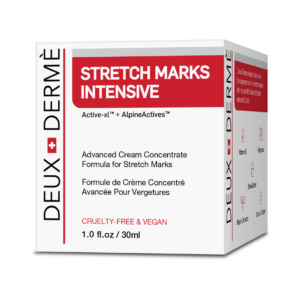Whether you’re suffering from stretch marks currently or trying to prevent them, there are some facts about stretch marks that you need to know that will help you live with less stress, prevent stretch marks more effectively, and understand what will and won’t get rid of stretch mark scarring.
Men Can Get Stretch Marks Too
While you typically hear more women stressing and complaining about stretch marks, it’s mostly because of the correlation between stretch marks and pregnancy. The truth is that men are just as likely to get stretch marks as women are, though men usually develop them due to rapid muscle gain, weight gain, or weight loss. Male bodybuilders worry about stretch marks almost as much as pregnant women!
Stretch Marks Can Develop Anywhere
Stretch marks are not exclusive to any part of the body—they can appear anywhere. Common places that stretch marks form are stomachs, thighs, breasts, arms, hips, and buttocks, but they can show up anywhere on your body where skin is stretched due to changes in the shape of your body.
Genetics May Make You More Susceptible
While there are differing opinions as to whether or not susceptibility to stretch mark scarring is inherited, some research shows genetics may play a role in your likelihood of developing stretch marks. If one or both of your parents have them, you may be more likely to develop them as well.
Age May Play a Role in Susceptibility
Collagen is a protein found in the body that plays a huge role in skin healing, elasticity, and strength. As you get older, your body produces less collagen. In fact, it is the reduction of collagen production by the body that causes skin to wrinkle. Ample collagen production makes you less likely to get stretch marks, so the older you are, the more important is it to take steps to prevent stretch marks.
Losing Weight Does Not Get Rid of Stretch Marks
You may think that stretch marks caused by pregnancy or weight gain can be eradicated by losing weight, but losing weight will not get rid of stretch marks. In fact, losing weight rapidly can actually cause more stretch marks to form!
Stretch Marks Do Not Go Away Without Treatment
After some time passes, stretch marks may fade in color from red to white. However, stretch marks do not go away on their own and must be treated in order to get rid of them. A number of treatment options are available for getting rid of stretch marks, including stretch mark creams, laser treatment, microdermabrasion, chemical peels, and microneedling.
Stretch Marks Are Considered a Cosmetic Issue
Though stretch marks can itch, get inflamed, and cause emotional distress due to the self-consciousness they cause in sufferers, health insurance companies always consider stretch marks a cosmetic issue and will not cover treatment. If you’re curious about how much treatment may cost, you can use our treatment calculator to get an estimate.


